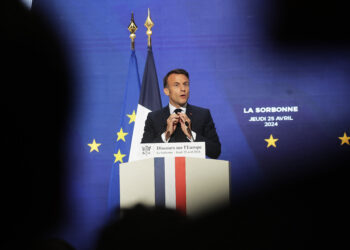Brussels – He said it, and he did it: French President Emmanuel Macron kept his promise and, in a video posted on X (formerly Twitter), answered some questions about the future of Europe. The head of the Elysée had delivered a nearly two-hour speech at the Sorbonne on what should be the way forward for the EU. In the end, given the importance of the subject and the difficulty of some of the topics discussed, Macron invited French citizens to ask him questions on social media that he would then answer. There were many questions that the French President chose to answer — from the European agricultural policy to military support for Ukraine and lighter topics such as the future of Kylian Mbappé.
In a video just under twenty minutes long, Macron answered some questions in a friendly but not superficial style. To those who ask why Europe is in danger today, the French President recalls the war in Ukraine and the fight against economic change; to those who ask about the advance of radical right-wingers, Macron replies that he does not stigmatize voters but politicians who play on people’s fear. On the critical question of how much the EU does on agriculture, the President recalls, complete with graph in hand, how France is the country that has gotten the most money from the CAP.
After serious issues, there were answers on lighter topics. A Shorts user asks the French president if the friendship pact between France and Germany is still in force. Macron answers in the affirmative in German by attaching a TikTok-style response in French from German Chancellor Olaf Scholz. Also relevant is the response to the question about the future of football star Kylian Mbappé, who will leave PSG in the summer. Macron said he is counting on Real Madrid (where the PSG number 10 will most likely move to) to release him for the European Championship and the Olympics.
— Bundeskanzler Olaf Scholz (@Bundeskanzler) May 11, 2024
Regarding the Olympic Games, national teams, since 1996, have the right to convene a maximum of three older players, that is, those over the age of 23. Almost all states give up exploiting more experienced players to let youngsters have the Olympic showcase. Over the years, mainly Brazil and Argentina have taken advantage of older players: Argentina selected Simeone (1996) and Riquelme (2008), while Brazil Ronaldinho (2008), Thiago Silva (2012), and a barely 24-year-old Neymar (2016). France, to date, has never resorted to older players. The Olympics at home combined with the relationship, including a personal one, between Macron and Mbappé, could lead to the 25-year-old champion wearing the national team’s jersey also at the Olympic Games.
English version by the Translation Service of Withub





![Una donna controlla le informazioni sul cibo specificate sulla confezione [foto: archivio]](https://www.eunews.it/wp-content/uploads/2014/12/Etichette-alimentari.jpg)

